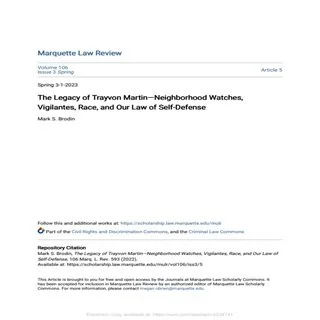By Mark S. Brodin
Reflecting back a decade later, what is the legacy of Trayvon Martin’s case, a teenage life violently cut short, and a legal system that accepted his death without consequence? Among other things, there is “The Trayvon Generation,” poet Elizabeth Alexander’s ruminations on the young African Americans who have grown up in the haunting shadow of this killing, and the anguished mothers who cannot protect their children from such a fate. “[T]o African Americans and other racialized minorities, Martin’s death became emblematic of the extreme outcomes of racial profiling enmeshed in a history of criminal laws arbitrarily targeting Black men.”
I begin with a close look at the Zimmerman trial, expanding on my earlier Howard Law Journal article with new access to an official audio-visual transcript. Then I put the case in its historical context by surveying the American tradition of vigilantism and its incarnation in the “neighborhood crime watches” (like Zimmerman’s) that have become so pervasive. Next, I contrast the response of the legal system to black as compared to white self-defense in notable cases. I conclude with an appraisal of our self-defense law -- doctrine and practice -- and the compelling need to reform it in light of what we have learned about implicit bias, unconscious stereotyping, and their role split-second panicked decision-making.
106 Marquette Law Review 593 (2022)




